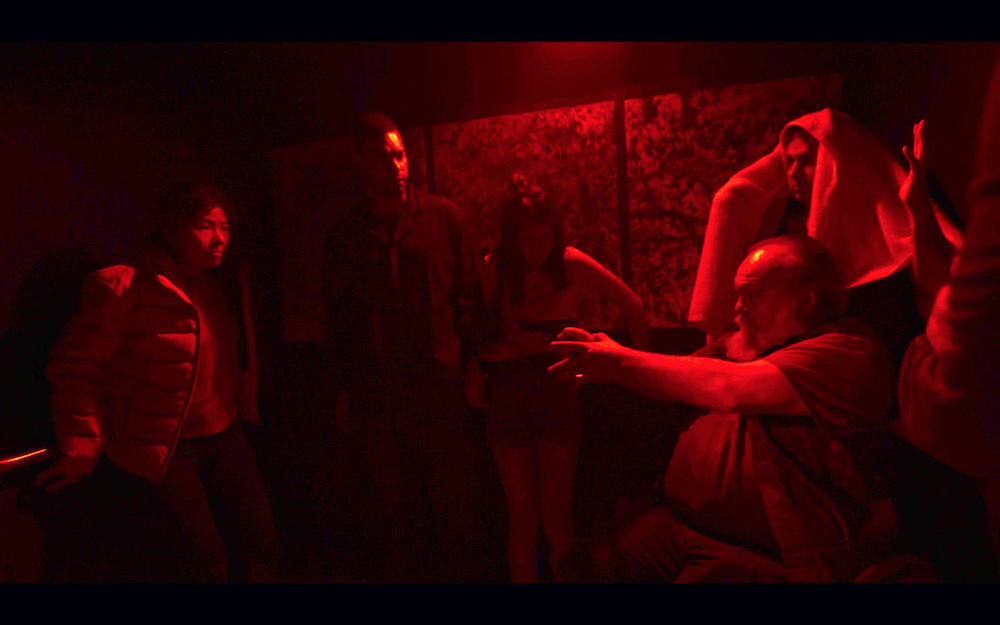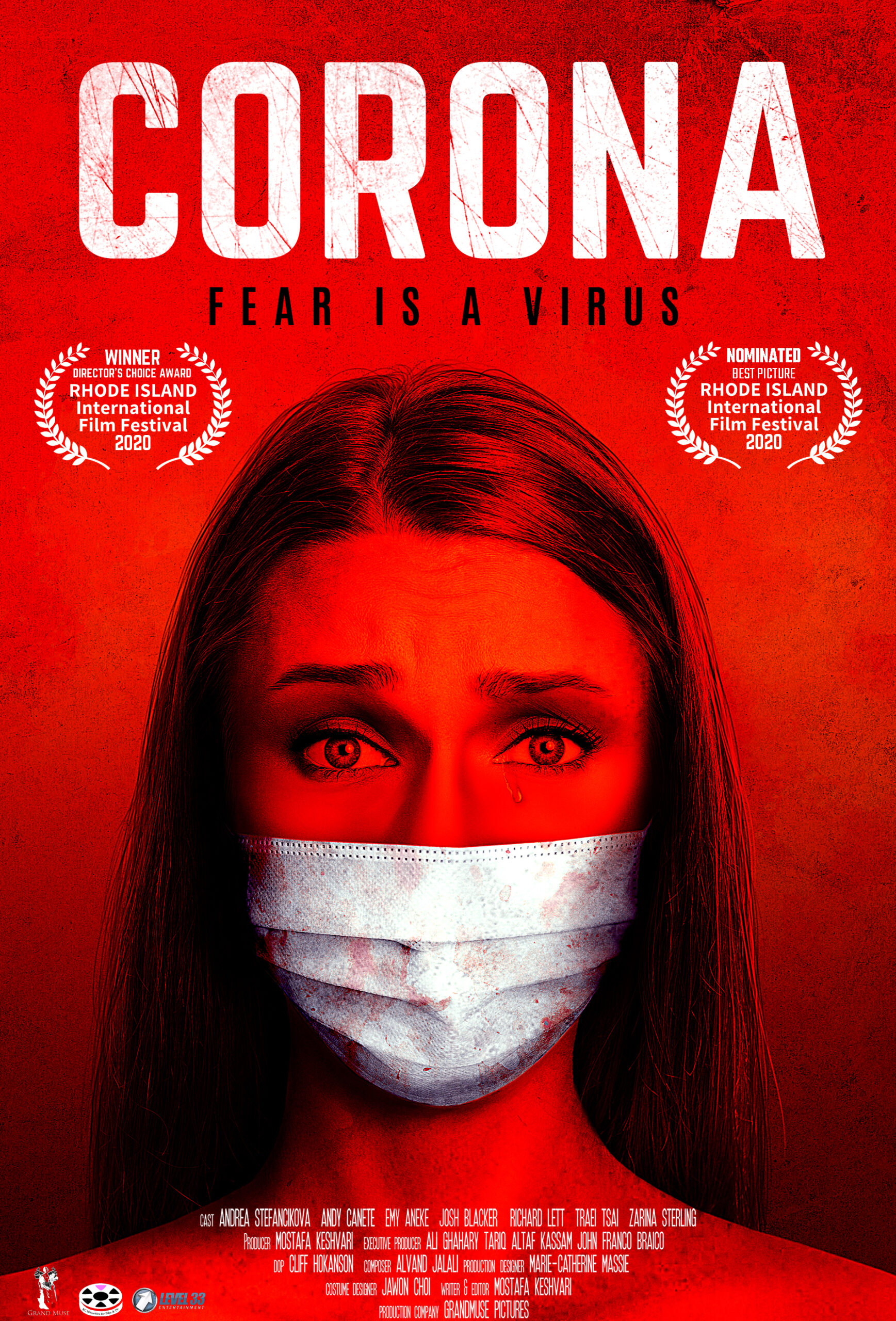Given todays pandemic climate, we’re all seeing the social tensions growing, despite the politics of wearing masks in multiple countries from multiple leaders. We all have to make a conscious choice on where we stand on issues surrounding our personal health… or whether or not you believe the virus is real. I personally know people that believe the Corona Virus is one elaborate hoax! We’re not close friends – but I was shocked and dismayed at their reasons. You can’t fix stupidity!
What is a visionary? I believe it’s someone that can look at the big picture and somewhat predict what is coming in the future with a good degree of accuracy. Some filmmakers have been referred to visionaries because the predicted stories within their films have actually happened. One such visionary filmmaker that we have in our own backyard (Vancouver) is Mostafa Keshvari. An Iranian-born Canadian director, writer and producer based in Vancouver, Canada and a member of Directors Guild of Canada (DGC), Writers Guild of Canada (WGC) and The Federation of Canadian Artists. He’s also the founder of Film Minorities for Film and TV Society ” which advocates for diversity and inclusion in the film industry.
He has over 50 imdb Awards and 4 Leo nominations for films, Unmasked, I Ran, The Will and the Wall and Music Box. His latest film Corona is sure to be added to the list and recently made its premiere on Sept. 1 across all major platforms in the U.S., such as Apple Movies, Comcast, Spectrum, GooglePlay, Microsoft, Redbox and others.
Mostafa never takes his finger off the pulse of social issues and has been an advocate for world peace, unity, diversity in film and the environment since he was young. His feature film Corona is about 7 strangers trapped inside an elevator… during the height of the pandemic and the urge to start judging each other in the heat of the moment. Are average and usually kind people capable of violence and prejudice when frustratin and panic set in? The cast is very diverse, both culturally as well as in social status.
We spoke recently…
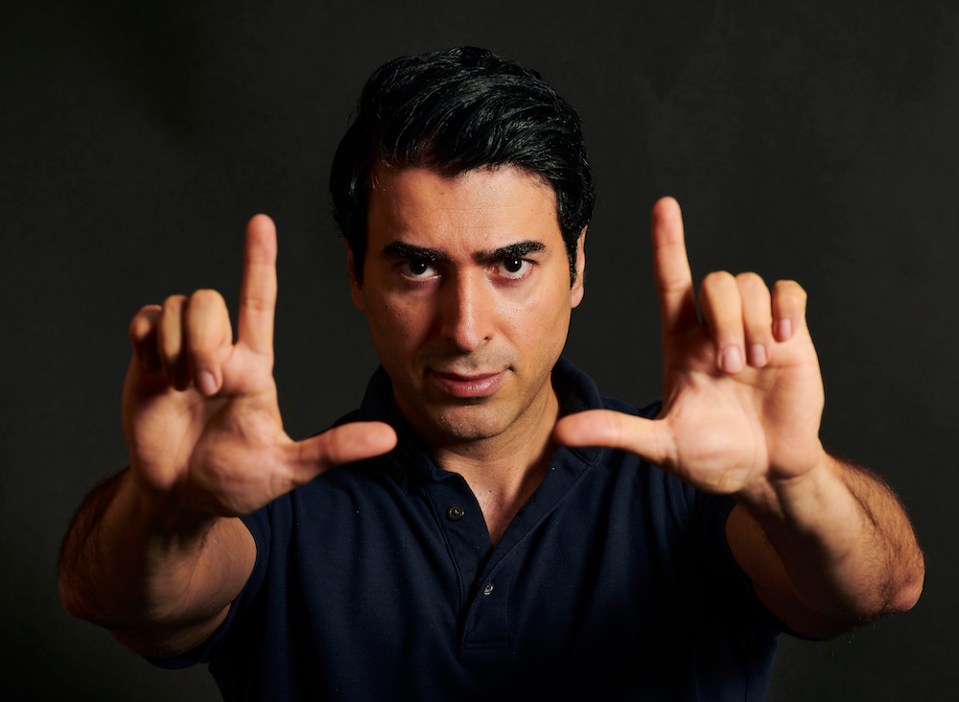
“Your films have done very well at the Cannes Short Corner Film Festival and the Oscar-Qualifying USA International Film Festival. What does it feel like to have that validation?”
“I think, as an artist it helps to know that you’re on the right track, but for me it’s always about doing what feels right and comes natural, not for the awards. When you work on projects that you believe in that you wrote, directed and produced, you have full creative control and you’re making films not just to be a filmmaker, you’re putting your heart into it.”
“I had read that you had conceived the idea for this film while in an elevator, then wrote it in 2 weeks, built the set in 10 days and shot it in 2 days. Did you feel an urgency to get this film made before the shutdown happened?”
“No, not at all. We didn’t know about the shutdown; we wrapped it on Feb. 14. I also do poetry and paint professionally and as an artist – when you have an idea you just do it, can’t wait for it to come to you again later. I use the same process with my filmmaking. If the universe wants to tell a story, then I’m just an instrument with a responsibility to tell that story. With a limited budget of an Indie filmmaker, you have to think outside the box, so I literally made the movie inside a box. There wasn’t the fear of the pandemic coming to Canada yet, so I had to recreate that by making the actors feel like it was a 1 take movie. By shooting it in 2 days it helped the actors to feel that fear and anxiety and to deliver the performance of someone who’s actually experiencing the pandemic.”
“Your films tend to tackle a lot of social issues and human injustices. When you’re writing a new screenplay, is that always at the heart of the story?”
“My dad was a lawyer and I grew up watching him fighting for social injustice. As a filmmaker, I wanted to travel down that same path. I also believe that a filmmaker has a responsibility to create films that are relevant to the society that you live in, as well as offering solutions to the problems. My films have been about people from all over the world with different stories that we can all connect to. Most people watch movies to escape reality but I want to make films that make reality better.”
“Was it difficult to find the cast?”
“No, we had my great friend Andrea Stefancikova (great actress) that had helped me with the casting. I think we have a lot of good actors in Vancouver that enjoy working on something more challenging and different. I really have to thank my casting director for finding so much great talent.”
“You were a banker before you were a filmmaker; what was the catalyst that caused you to switch gears and go to film school?”
“All of it is a form of art – I had published a poetry book before and I also do painting; banking was a way for me to learn about financing and to have a backup plan because it’s difficult to fully commit to your art without being worried about financial stresses. It definitely helped me after graduating film school (VFS). The banking helped me to become a better producer. Sometimes you have to do the things you don’t necessarily like in order to do the things you like in the future – I knew I had to have a foundation in order to make the films I wanted to make. Many people are out there working on projects just for the paycheque. I’ve been fortunate enough to work on projects that I enjoy but also pay my bills.”
“No regrets in becoming a filmmaker or do you miss the banking?”
“No, I think it was meant to be, I believe in the concept of Darwin and everything in the universe has a purpose – to find your purpose, you have to go through different journeys and when you look back it all makes sense. It’s all part of the process and as an artist you also have to be a business person, otherwise you’ll have a hard time bringing your vision to reality. I think a lot of artists have a hard time actualizing those ideas without having money or an understanding of it.”
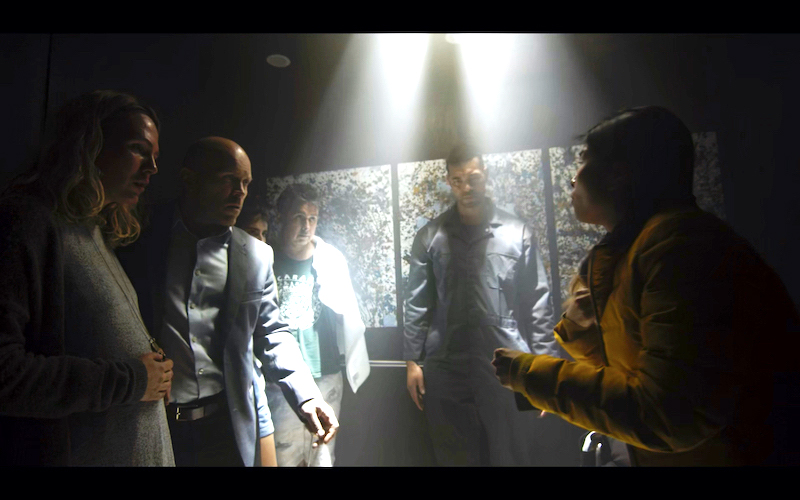
“I know that you wanted to touch on social issues and xenophobia in this film. Were you able to inject all the issues you had intended on bringing attention to in this film?”
“In this film, the main issue was racism as well as demonstrating the symbolism of different levels of society and that we all need to make it work. The only way to bring harmony is through understanding. The other issue I wanted to shine a light on was immigration and how the world has gotten smaller. If something happens in China it’s accepted by the globalization idea. We can’t solve the issues of the world by limiting ourselves to one country – the world is connected together and what happens in one country affects everybody else. We have to come together as a human race to solve global issues. I don’t believe Nationalism will solve global problems, such as environmental and pandemics.”
“I know that you wanted to release this film in a theatre but the pandemic had halted those plans. You must have incredible patients to have to wait until Sept. 1st for the release on multiple platforms?”
“It’s been postponed so long and we wanted to release it earlier but we realized, that because of the pandemic it wasn’t possible. I do think it was great that the first Corona film was made by Canadians as well as being universally relevant and I hope they all get the message – that no matter where were from, we’re all connected by this pandemic. In times of difficulty our true colours come out and although Canadians are known as nice people, which is true, but… can we remain great human beings during these hard times – because that’s where it counts. The reason we’re doing better than the US is because we have that unity and understanding of each other.”
“Where did you build the elevator/set?”
“We built it in a studio and at the time there was no Covid threat, so we could build the set without having to worry about close proximity – I don’t think it would have been possible 2 – 3 weeks later because that’s when they started shutting everything down. Everything was shot in one location and it took 70 times to get it right and make it a single take. I did it this way, so the audience will feel like they’re part of the movie and traveling with the passengers. We want the audience to put themselves in the characters’ shoes and feel like they are trapped. I think a lot of people have experienced that – being inside an elevator with someone else; we judge them based on how they present themselves and how they treat others.”
“How did you go about financing the film?”
“As I said, it was a low budget/no budget film. We had some sponsors because the people I have contact with know the kinds of films I make. I’m a minimalist filmmaker, meaning – a lot of actors worked for free. Most of the work went into freeing up barriers in the making of it in 2 days. Many people are afraid to make a feature; they think you need a big set with explosions and all those other things – but if you have a good story, you can find a way to tell it, no matter what. The great talent that’s here in Vancouver will do anything to be part of a story if they really like it. As a filmmaker in Vancouver we get so much support for our work from some really great talent, as well as some great organizations.”
“When you had the premise to make this film, was it partially to prove to yourself that you could pull it off – or was it to have a great story told with very long blocks of dialogue that move the story forward?”
“I did want to challenge myself to see if I could tell a story with all these limitations. I wanted to use a different method because something I’ve seen in other movies, is unrealistic dialogue, lots of cuts – you can almost feel disconnected and I wanted to do something that felt more real. I believe a lot of Indy actors improvise a lot of lines in a storyline, so they knew the ‘beginning’ and the ‘end’ of the scene. I wanted to know what people would actually say. If you were a racist person, you’d be lying about what you’d say. We wanted it to be raw, we wanted it to be real and I wanted an overlapping conversation the way you’d experience it in reality. The actors also loved it too because it gave them the freedom to improvise. The result was amazing and with only 2 days to shoot it, helped to create that anxiety and fear… because its hard to feel that when there’s no pandemic. With only using a single take, they were very nervous about doing it again – every time they made a mistake they’d have to start over. As a filmmaker you have to use all the tools you have to recreate an environment and at the same time, to challenge yourself. For me, it was more about doing something different, that hadn’t been done in Vancouver, something I’ve never done myself and the fear of the unknown.”
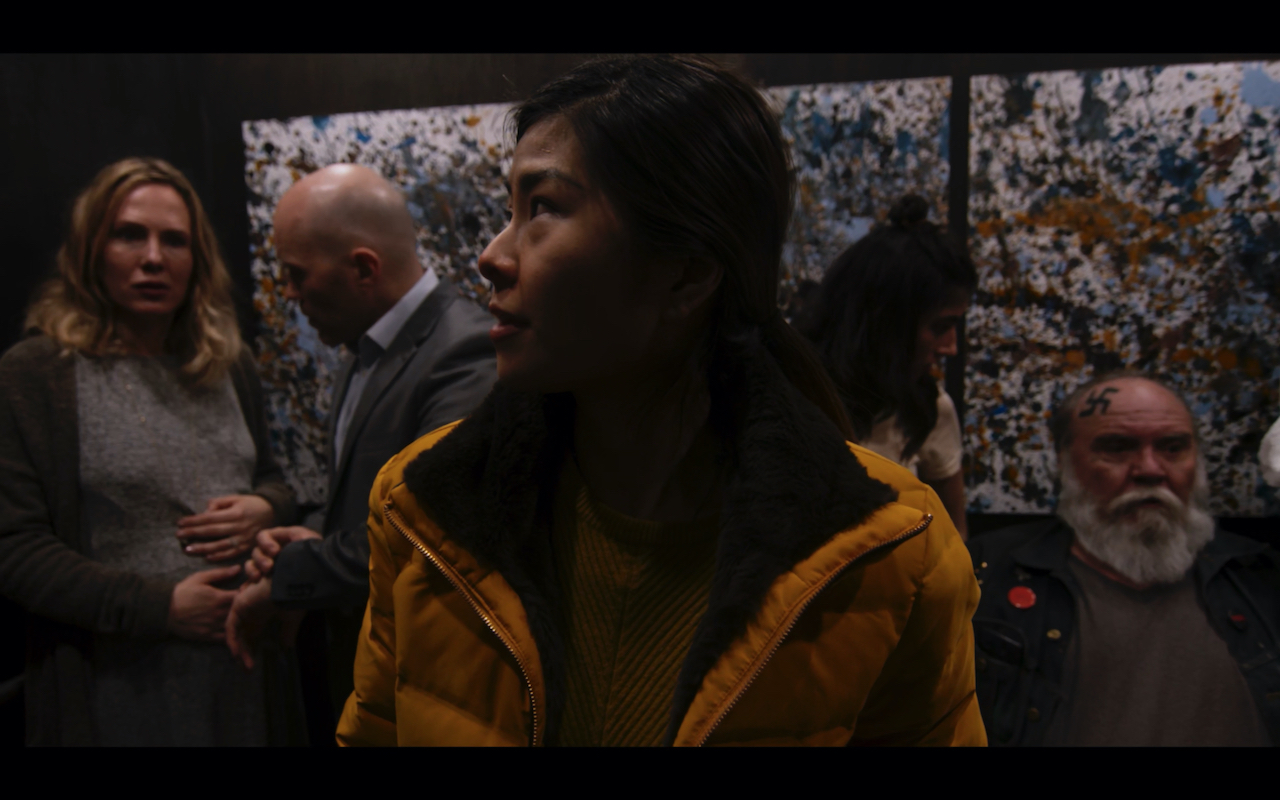
“If you were stuck in an elevator in the same situation, how well do you think you would you manage?”
“I think knowing that we are in the midst of a pandemic, it’s pretty scary. This film was a little dramatized for story purposes but depending on where you are in the world it varies. This story takes place in the US, so it’s a little different over there. It’s a little different in Canada – depending on your age, the risks you have and how serious you take the pandemic. For me, I’m very vigilante in wearing a mask; not just for me but I also respect other people’s lives even though I might not get sick, it could happen to other people. I realize I’m part of a bigger picture in society and I have to be a responsible citizen. This film is all about putting yourself in other people’s shoes. In a capitalistic world, it’s all about me, my individualism and my freedom. You feel disconnected from society and I believe that’s when the problems come from, in handling this pandemic. In Canada, we haven’t experienced that kind of hardship, so it’s difficult to sacrifice our freedom for something else.”
“What size of crew did you use to make this film?”
“The entire cast and crew were less than 30 people. There was a cast of 7 and a crew of 20. Most of the crew I’ve worked with before – I’m a member (founder) of the BC Minorities for Film and TV Society, where we promote diversity and inclusion in film. I always strive to have a very diverse cast and crew.”
“I wanted to ask you about that. You’re the founder of ” BC Minorities for Film and TV Society. When did you start it and how many members are there?”
“We started 14 months ago before the movement happened. I felt that as a minority filmmaker, nothing will happen if I don’t. As Gandhi would say… ‘Be the change you want to see in the world’ which is the reason I started the movement. We’re also launching a new campaign to make it more accessible for everyone. The pandemic caused a lot of workshops to be postponed, so we’re adopting to the new environment. Our main focus has been to help minority filmmakers break into the film industry and obtain higher positions because many times they don’t have those opportunities. I’m a member of Directors Guild of Canada (DGC) and it took me 4 years to get there. I realize the hardships and difficulties that other filmmakers have in getting to those places, so this organization is there to help them contribute and tell their stories.”
“You’re also a published poet and professional painter that put his pieces in his films?”
“I feel that as an artist you want to immerse yourself in art and express yourself in every way you can. I was a poet and a painter before I was a filmmaker, so art has always been part of my life. As part of the production design I always try to paint something that goes with the movie. In my other films, such as my first feature film Unmasked, I put a lot of poetry in it. With this film, much of it was improvised – so there wasn’t any room for poetry but I’ve used my poetry in my other films. As an artist you’re constantly wanting to engage and express yourself.”
“Let’s switch gears a little. Have you ever wanted to try an extreme sport?”
“I actually used to play soccer professionally back home (Iran) but had gotten injured early in my career and couldn’t continue. I’ve done some motorcycle riding but found it pretty dangerous, so I quit that. I also box and coach, so I try to stay active but my favourite sport is definitely soccer.”
“If you had a super power, what would you want it to be?”
“I think it would be to connect with peoples’ hearts instead of their minds. I’d like to know what’s in their hearts. I believe that if you can reach people through their hearts you can solve things much faster and it will last longer.”
“What is your biggest fear?”
“My biggest fear is not being able to tell the stories you were meant to tell; like the saying goes… the music died inside you. You never know how much time you have in this world, so you want to create as much as you can.”
